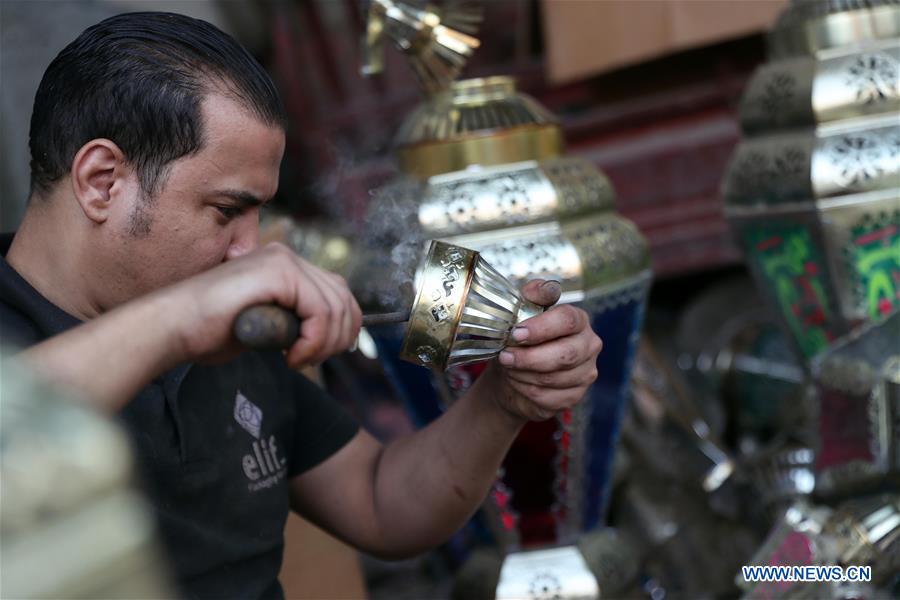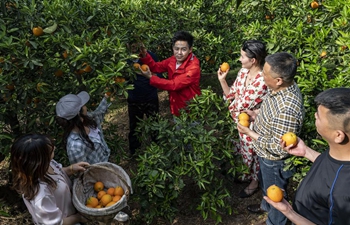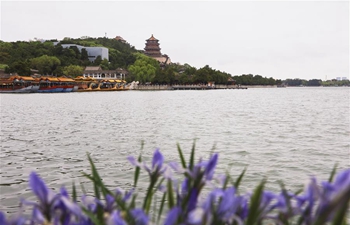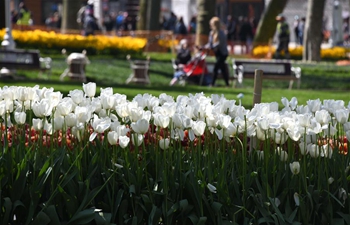
A man makes a traditional handmade lantern at his workshop in Cairo, Egypt, May 3, 2019. Ahead of the Muslim holy month of Ramadan, customers flock to markets in the Egyptian capital of Cairo to buy colorful lanterns, known as fanoos in Arabic, a tradition that has been followed by Egyptians for centuries. (Xinhua/Ahmed Gomaa)
by Ahmed Shafiq
CAIRO, May 4 (Xinhua) -- A few days ahead of the Muslim holy month of Ramadan, customers filled markets in Egyptian capital Cairo to buy colorful handmade glass and metal lanterns, known as fanoos in Arabic, a tradition that has been followed by Egyptians for centuries.
"Buying lanterns for my children is kind of a must," Heba Magdy, a mother in her early 30s, told Xinhua as she searched for lanterns for her two kids in a local market.
"Ramadan lanterns are a source of joy for Egyptians regardless of their age," she said.
The fanoos originated in Egypt during the Fatimid caliphate hundreds of years ago when they served to light dark streets, but later on became traditional children's toys for outdoor playing on Ramadan evenings.
They are no longer considered mere toys for children, as currently most men buy traditional Ramadan lanterns as gifts for their fiancees or wives while some housewives buy them to light up their homes.
Since last week, Egyptians started to decorate the streets and narrow alleys and house fronts with lanterns to welcome the holiest Islamic month which starts on Monday.
During the month, Muslims abstain from eating, drinking, smoking and conducting sexual relations from sunrise to sunset.
To get a good lantern with a reasonable price, customers prefer to approach Old Cairo's bazaars such as Sayyida Zainab and Khan al-Khalili.
"The prices this year are a little bit higher than the previous year, but we have to buy lanterns for our kids to make them happy," the lady said as she checked a sea-blue lantern.
Magdy said Ramadan is a month that brings happiness to Muslims, adding that part of this happiness is buying the Ramadan fanoos.
However, Magdy said the prices of lanterns should be cheaper, so poor people can buy them to make their kids happy and keep the tradition.
Over the past few years, Egypt has been struggling to overcome an economic recession resulting from political turmoil and relevant security challenges, which led the country in late 2016 to start a strict three-year economic reform program.
The program includes austerity measures, energy subsidy cuts and tax increases, in addition to local currency floatation to contain U.S. dollar shortage.
Despite causing price hikes and high inflation rates, the liberalization of the Egyptian pound's exchange rate encouraged the International Monetary Fund (IMF) to support Egypt's reform plan by providing a 12-billion-U.S. dollar loan.
Last year, the Center for International Development at Harvard University ranked Egypt as the world's third fastest growing economy in the coming decade after India and Uganda.
Egypt also achieved a high growth of 5.3 percent in the 2017-18 fiscal year, which runs from the beginning of July to the end of June.
"I sell both handmade and China-imported lanterns...some people prefer the local ones, but many also seek the Chinese-made ones since they are cheaper," Abdo Sharkawy, a seller of Ramadan lanterns told Xinhua.
The man said this season is much better than the last one, noting that more people are buying lanterns despite the price hikes.
"People may borrow money to buy lanterns because they are an essential part of the holy month," Sharkawy said as he placed big lanterns at his shopfront.











